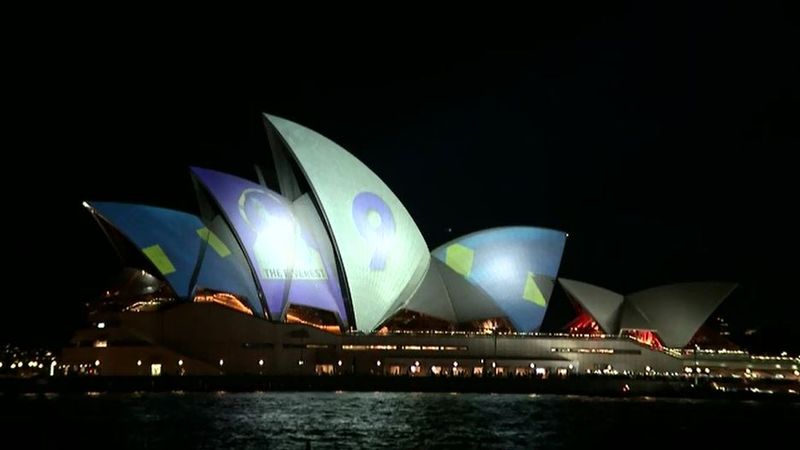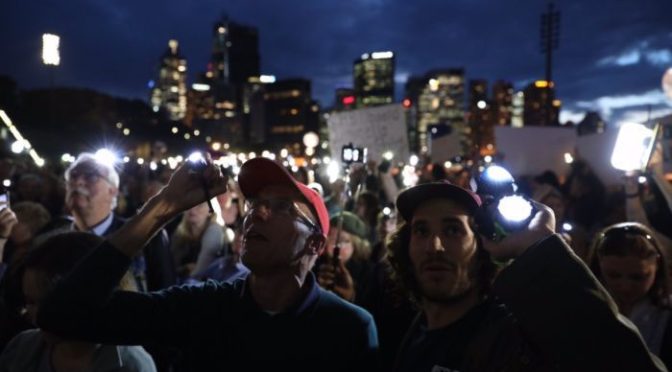Gambling is a scourge on our society. It seems to me that it’s one of a handful of social issues — alongside alcohol, domestic violence, our treatment of our indigenous peoples, and refugees — that occupies a similar blind spot for us Aussies that is similar to guns in the U.S psyche.
We Aussies sometimes like to look down our noses at the stranglehold the N.R.A has on gun control law in America, so this week it’s been revealing to see just how deeply enmeshed the gambling industry is in Australian life as a big-money horse race took over a national icon (paid for by lotteries), the Sydney Opera House. The manager of this cultural precinct didn’t want it given over to this modern idol of our culture, and a radio host with pretty strong links to the racing industry slammed her, leading the charge in such a way that our political leaders fronted the media to justify (and support) an industry that destroys lives (but lines the public coffers, and the coffers of our political parties), first the Premier of New South Wales, then the Prime Minister. Here’s what Prime Minister Scott Morrison had to say:
“This is one of the biggest events of the year. Why not put it on the biggest billboard Sydney has? These events generate massive economic opportunities for the state, for the city.”
It’s the economy. Stupid.
A federal government study on the deleterious impact of race betting on Australians found:
Among other things, survey data tell us that in 2015, nearly one million Australians regularly gambled on horse and dog racing. Most race bettors were men, and aged between 30 and 64. Their typical monthly expenditure on race betting amounted to $1,300 each over the year. Some 400,000 experienced one or more gambling-related problems.
Now. Like many Aussies — including the 290,000 who signed a petition against this advertising campaign that the New South Wales government refused to accept, I’m pretty disillusioned about Australian politics.
I feel helpless and on the sidelines while watching things like this unfold. Political action seems pointless.
I think there are plenty of dark times ahead for those of us who want a democracy built on making space at the table for one another, and pursuing civility and the ability to live well together. I despair about our treatment of refugees, and the unborn. I despair about much Christian advocacy in its misrepresentation of those we disagree with (so, for example, while I think it’s bad legislation, I don’t think the spirit of the new abortion laws in Queensland is to allow women to terminate pregnancies for whatever reason they want up until birth, and I don’t think the pro-life case is helped by painting the ‘other’ side this way).
I’m struck by how much responsibility and hope we give to politicians to solve our social issues, a phenomenon James Davison Hunter observed in his book To Change The World, and how much then we run to ideological camps where we can sling rocks at those opposed. He says:
“If modern politics is the sphere of leadership, influence, and activity surrounding the state, politicization is the turn toward law and politics — the instrumentality of the state — to find solutions to public problems.”
This is the way our public conversations are framed — when there’s a problem we want others to solve it; specifically, the state. And we do our part by making lots of outraged noise on social media, and signing petitions (and there’s a place for this, of course). But what if this limits our imagination when it comes to other solutions?
Hunter says:
“Politics has become so central in our time that institutions, groups, and issues are now defined relative to the state, its laws, and procedures. Institutions such as popular and higher education, philanthropy, science, the arts, and even the family understand their identity and function according to what the state does or does not permit… it is only logical then, that problems affecting the society are seen increasingly, if not primarily, through the prism of the state; that is, in terms of how law, policy, and politics can solve them.”
Hunter also suggests this politicization frames our ‘common life’ so much that it gives birth to the sort of ideological posturing that has killed our ability to disagree well, or seek compromise. It also means there is no ‘public’ space or ‘commons’ that is not politicised (like the Opera House). He says:
“Politics subsumes the public so much so that they become conflated. And so instead of the political realm being seen as one part of public life, all of public life tends to be reduced to the political… This turn has brought about a narrowing of the complexity and richness of public life, and with it, a diminishing of possibility for thinking of alternative ways to address common problems and issues.”
Perhaps the only thing worse than the collapse of the public space into the political, is the giving over of public space — the commons — to the market, especially when that’s a political decision made for apparent political gain (it’s the economy stupid). Another book I’ve been particularly challenged by this year, Matthew Crawford’s The World Beyond Your Head: How To Flourish in an Age of Distraction, makes the point that the sort of paying attention is much harder when our public spaces are now places where we are bombarded with messages from private enterprise. He says clear public space — the ‘commons’ is necessary for ethical life together — for listening to one another long enough to escape ideological posturing, or the darkness of the world around us.
“The idea of a commons is suitable in discussing attention because, first, the penetration of our consciousness by interested parties proceeds very often by the appropriation of attention in public spaces, and second, because we rightly owe to one another a certain level of attentiveness and ethical care.”
Crawford uses the example of the airport to make his point — and its a tale of two lounges, the private airline lounges and the public lounges around the gates. In the public space companies have paid to bombard you with advertising material — billboards, TV screens, businesses, while in the private space you’re offered the luxury of distraction free comfort. The wealthy have the luxury of not needing the ‘commons’ to avoid the privatised messaging they don’t want — they pay for something not-so-common (and it’s perhaps, the same with the Opera House, I wonder what the outcry would be like if these adverts were projected on the curtains of the Opera before or after a performance). Here’s Crawford setting the scene:
Or do we? Silence is now offered as a luxury good. In the business-class lounge at Charles de Gaulle airport, what you hear is the occasional tinkling of a spoon against china. There are no advertisements on the walls, and no TVs. This silence, more than any other feature of the space, is what makes it feel genuinely luxurious. When you step inside and the automatic airtight doors whoosh shut behind you, the difference is nearly tactile, like slipping out of haircloth into satin. Your brow unfurrows itself, your neck muscles relax; after twenty minutes you no longer feel exhausted. The hassle lifts. Outside the lounge is the usual airport cacophony. Because we have allowed our attention to be monetized, if you want yours back you’re going to have to pay for it. As the commons gets appropriated, one solution, for those who have the means, is to leave the commons for private clubs such as the business-class lounge. Consider that it is those in the business lounge who make the decisions that determine the character of the peon lounge, and we may start to see these things in a political light. To engage in playful, inventive thinking, and possibly create wealth for oneself during those idle hours spent at an airport, requires silence. But other people’s minds, over in the peon lounge (or at the bus stop) can be treated as a resource—a standing reserve of purchasing power to be steered according to innovative marketing ideas hatched by the “creatives” in the business lounge.”
Ouch.
Crawford also talks about the mechanics of addiction, and the way the gambling industry (especially pokie machine makers) exists as a parasite with the express goal of having customers ‘play to extinction’… distracting us to oblivion with bright lights and pretty colours (and some other pretty nefarious techniques).
This outsourcing of decision making to our law makers means the stakes are impossibly high. If we think reducing gambling, domestic violence, alcohol abuse, or pregnancy terminations, depends on our politicians we lack imagination, and we over-estimate the capacity of our leaders to escape their own political interests and deliver actual results. If we put all our eggs in that basket then to lose the political battle is to lose the war…
If we want to stand against darkness, the answer is bringing light. It’s to stop outsourcing problem-solving to government and to start acting as citizens, forming institutions and movements, to model a better way forward. This is perhaps particularly true for Christians given the way light and darkness work in our story.
And there’s no better picture of the power of light to trump darkness than the way protestors standing in the Opera House forecourt tonight disrupted the projection of the gambling ads onto the Opera House sails. With torches. With light. They didn’t quite have enough torch-power to overcome the industrial sized projectors throwing the ads up, but they tried, they were noticed, and if more of us imagined non-political solutions to social problems that involved harnessing people power we might see changes to how public life happens… it’s this evocative picture of light starting to overcome even the brightest darkness.

There’s much that we Christians could learn about how to participate in a public that seems increasingly dark. We might stop putting our effort into political solutions to the problems around us and start shining light in such a way that the darkness is obscured. We might trust that eventually, though it feels like we’re pushing up hill, enough light shone on something dark will buckle it and break it… no matter how deeply enmeshed a problem is… And maybe we’ll bring a renewed sense of imagination to the task of ‘politics’…
Instead of standing outside abortion clinics, protesting to change legislation as ‘political speech’ (or just getting in the face of the ‘other’) in what our legislators have created as exclusion zones, we might keep building communities that are inclusion zones for vulnerable parents-to-be. Instead of just looking for political solutions on domestic violence we could start refuges and services to make escaping that darkness more possible for women. Instead of playing the same partisan ideological game where we want to win the political fight at all costs, at all times, we might try to make room in public for the people we disagree with to be truly seen and heard. Instead of making political arguments seeking a win over the other, we might seek to win the other over to the light (you know, by making Christian politics about Jesus…).
Hunter and Crawford are describing some things that I’d love to see transform the way we approach politics in Australia. It would be amazing and transformative if we stopped peddling the narrative that politics will solve everything, or giving the keys to the ‘public’ to these leaders who then rely on private dollars to hold on to power. It’d be amazing if we all took up our torches to bring light into these unseen problems in our psyche — our cultural dependancy on gambling and alcohol, and the violence that seems so endemic behind closed doors (62 women have been killed as a result of domestic violence this year, seven women in the last six days… while zero people were killed by needles in strawberries).
The downside to all this optimism about people power, of course, is the images from history of angry mobs with torches hunting down those on the other side. Here’s where I reckon the optimism of plenty of political activism breaks down — the idea that we could, or would, do a better job than those in power if we took the power off them.
There are plenty of iconic torch-carrying-mob pictures we could consider from some of humanity’s darker moments, but perhaps none are more iconic than this one.
So Judas came to the garden, guiding a detachment of soldiers and some officials from the chief priests and the Pharisees. They were carrying torches, lanterns and weapons.
Jesus, knowing all that was going to happen to him, went out and asked them, “Who is it you want?”
“Jesus of Nazareth,” they replied. — John 18:3-5
People power can be harnessed for some pretty dark stuff.
Jesus, the ‘light of the world’, approached in the night by a mob carrying torches trying to outshine his light… but even in this moment, the start of his darkest hours, Jesus is triumphing by refusing to play the political game the world expects. It’s like the words of Jesus that John recorded back near the start of his story were prescient.
“This is the verdict: Light has come into the world, but people loved darkness instead of light because their deeds were evil. Everyone who does evil hates the light, and will not come into the light for fear that their deeds will be exposed. But whoever lives by the truth comes into the light, so that it may be seen plainly that what they have done has been done in the sight of God.” — John 3:19-21
This is the uniquely bright light we have to shine on the problems of this world — the light of the world, Jesus, has much to offer when it comes to addressing violence against women, alcohol addiction, gambling, and how we treat the unborn. Jesus, the Lord of heaven and earth, isn’t just an alternative to worldly powers, but offers a rationale for rejecting the ‘politicisation of everything’ and the idea that human governments should be responsible for solving all the world’s problems. He’s the king who doesn’t sell us out for his own interests so that the ‘commons’ is turned against us, but who gives himself as a ransom to bring us from ‘the kingdom of darkness into light’. He invites us into the kingdom, he invites us to turn on the torches, knowing that even in those moments where it doesn’t seem we’re cutting through the darkness, or over-powering the bright lights of our cultural idols, his light is not overcome. He gives us a type of political action that isn’t pointless — the call to point people to God’s kingdom in our participation in the public sphere.
“You are the light of the world. A town built on a hill cannot be hidden. Neither do people light a lamp and put it under a bowl. Instead they put it on its stand, and it gives light to everyone in the house. In the same way, let your light shine before others, that they may see your good deeds and glorify your Father in heaven. — Matthew 5:14-16

